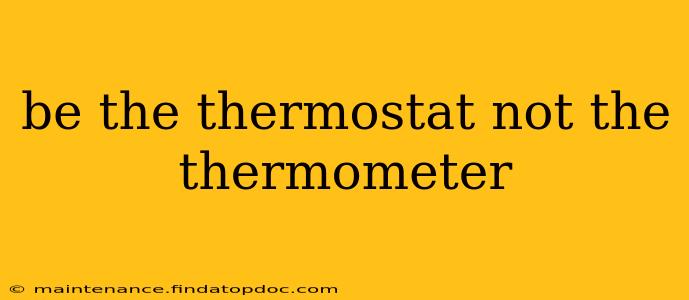Feeling overwhelmed by external pressures? Do you find yourself reacting emotionally to every little challenge, tossed around like a leaf in the wind? Then it's time to learn the powerful principle of being the thermostat, not the thermometer. This isn't just about emotional regulation; it's about taking control of your life and shaping your destiny.
This phrase, "be the thermostat, not the thermometer," emphasizes the crucial difference between reacting to your environment and proactively shaping your response to it. A thermometer simply reflects the temperature of its surroundings; it's passive. A thermostat, on the other hand, actively regulates and maintains a desired temperature. It's proactive. This analogy perfectly illustrates the power we have over our emotional state and reactions.
What Does it Mean to Be the Thermostat?
Being the thermostat means taking ownership of your emotional responses. Instead of allowing external events to dictate your feelings, you consciously choose how you will react. It’s about developing emotional intelligence and cultivating internal resilience. This involves several key elements:
1. Identifying Your Triggers
The first step in becoming the thermostat is understanding what triggers your negative emotions. What situations, people, or thoughts consistently push you into a reactive state? Identifying these triggers allows you to anticipate and prepare for them. Keep a journal to track your emotional responses and identify patterns.
2. Developing Self-Awareness
Self-awareness is the cornerstone of emotional intelligence. It's about understanding your own emotions, recognizing how they manifest in your behavior, and acknowledging the impact of your feelings on others. Mindfulness practices, such as meditation or deep breathing exercises, can significantly enhance your self-awareness.
3. Cultivating Emotional Regulation Skills
Once you understand your triggers and become more self-aware, you can start to develop strategies for managing your emotional responses. This could include techniques such as:
- Cognitive reframing: Challenging negative thoughts and replacing them with more positive and realistic ones.
- Mindfulness meditation: Practicing present moment awareness to reduce reactivity and increase emotional regulation.
- Deep breathing exercises: Calming your nervous system and reducing stress.
- Physical exercise: Releasing endorphins and improving overall mood.
4. Setting Boundaries
Setting healthy boundaries is essential for protecting your emotional well-being. This means saying "no" when necessary, asserting your needs, and limiting exposure to situations or people that consistently trigger negative emotions. Learning to say no effectively is a vital skill for maintaining your emotional equilibrium.
5. Practicing Self-Compassion
Being kind to yourself, especially during challenging times, is crucial. Self-compassion involves acknowledging your imperfections, treating yourself with understanding, and recognizing that everyone makes mistakes. Instead of self-criticism, focus on self-encouragement and learning from your experiences.
Frequently Asked Questions (FAQs)
How can I stop reacting emotionally to criticism?
The key is to separate the criticism from your self-worth. Ask yourself: Is this criticism constructive and valid, or is it personal attack? If it's constructive, focus on learning from it. If it's a personal attack, recognize that it reflects the other person's perspective, not necessarily your reality. Practice self-compassion and remind yourself of your strengths.
What are some practical tips for improving emotional regulation?
Engage in regular self-care activities, like exercise, healthy eating, and sufficient sleep. Practice mindfulness and meditation to improve your awareness of your emotions. Identify and challenge your negative thought patterns. Seek professional help if you're struggling to manage your emotions independently.
Is it always possible to be the thermostat?
No, there will be times when you'll experience strong emotions that are difficult to control immediately. The goal is not to eliminate emotions entirely but to manage them effectively, reducing the intensity and duration of negative feelings and increasing your ability to respond constructively instead of reacting impulsively. Accept that you are human and allow yourself to feel your emotions, but don't let them control you.
How long does it take to develop these skills?
Developing emotional intelligence and becoming the thermostat is a journey, not a destination. It takes consistent effort and practice. Start small, focus on one skill at a time, and be patient with yourself.
By consciously choosing to be the thermostat, you gain control over your emotional landscape, creating a more positive and fulfilling life. You become the architect of your own emotional well-being, shaping your responses and navigating life's challenges with greater resilience and wisdom. Remember, it's a process, and the journey itself is a testament to your growth and strength.
